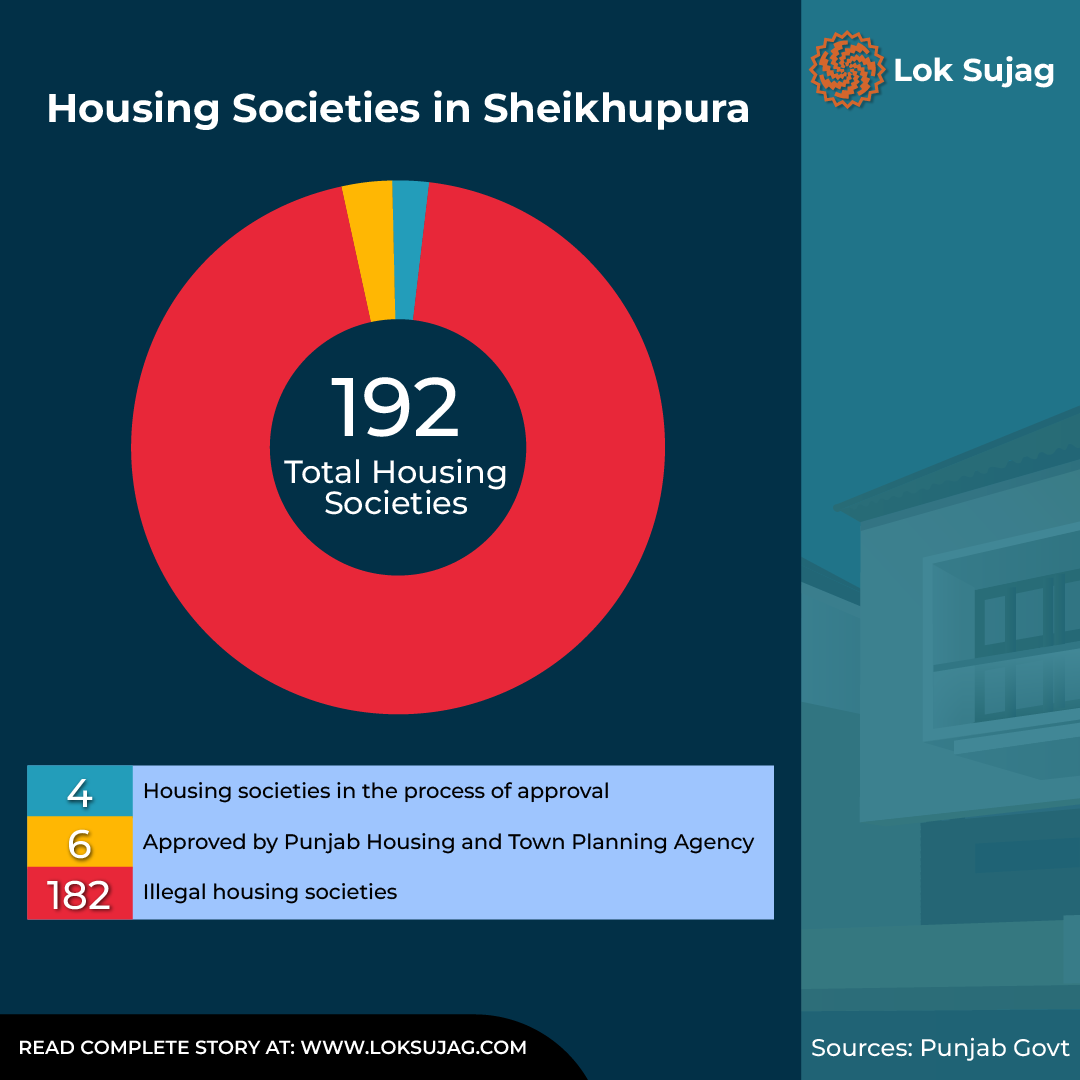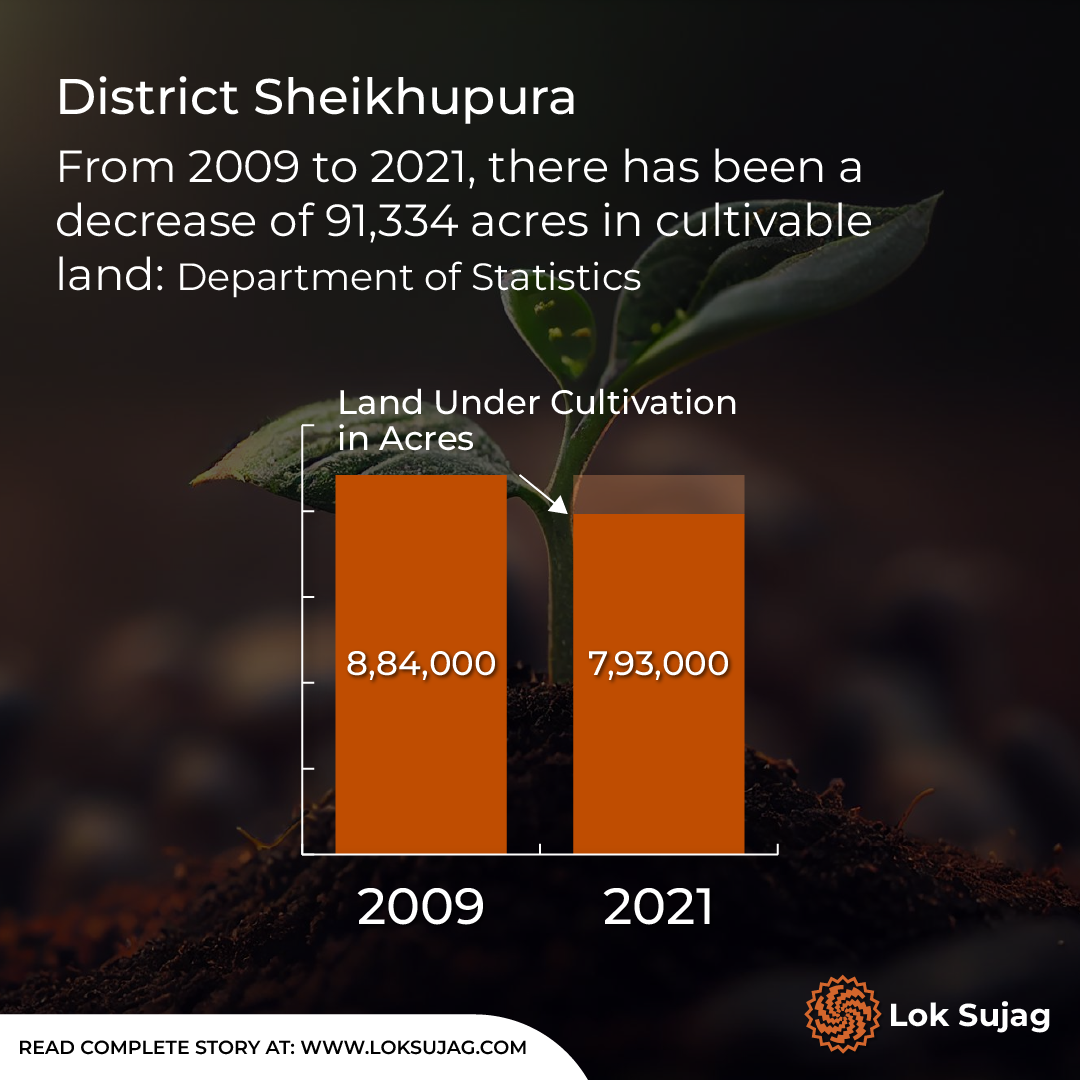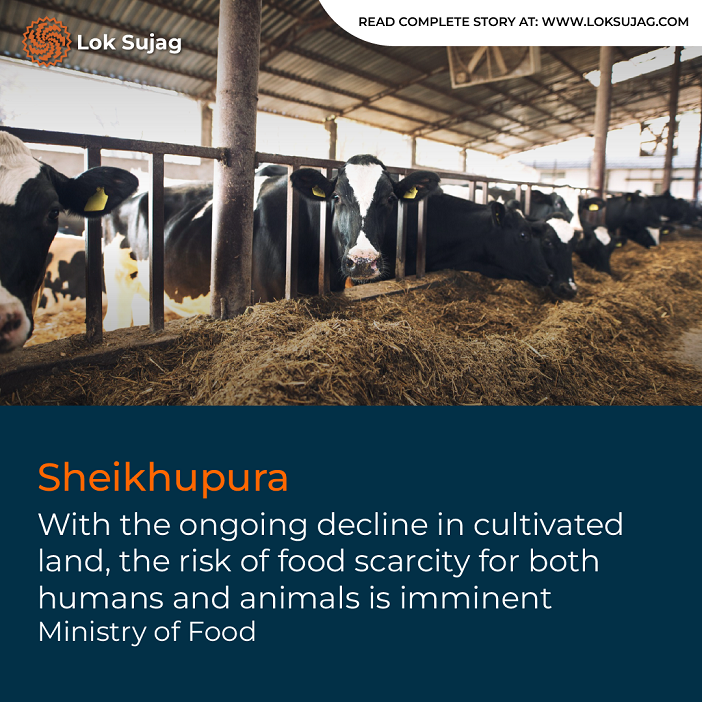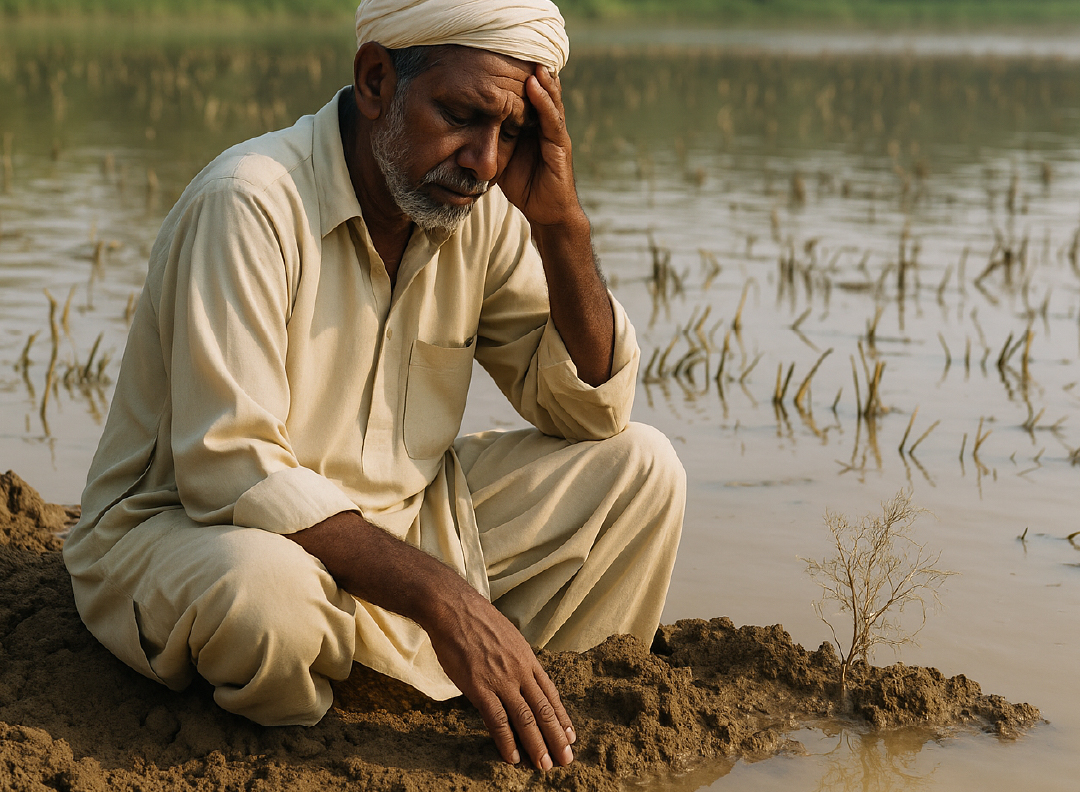Zafar Iqbal was compelled to sell his two acres of fertile agricultural land to a housing society due to the unwavering determination of his children.
Two months ago, he sold his land for five crore rupees, and the housing society owners took immediate possession by remitting a deposit of five lakh rupees.
As per Iqbal, there was an agreement to settle the remaining five crore, 40 lakh rupees. However, even after two months, he has not yet received the promised amount.
“Each time I contact them, they inform me that a sizable check is on the verge of clearing, and payment will be processed promptly upon receiving funds.”
Iqbal resides in Burj Attari, a town within the Sheikhupura district. His agricultural land was situated near the Faizpur Interchange, at the convergence point of Sheikhupura and Lahore, in an area teeming with housing societies.
Zafar Iqbal insisted on not selling his inherited land under any circumstances. However, now that the children are grown, they perceive that the two acres of land are insufficient to cover even the basic household expenses. This raises the critical question: How can they improve their future?

“For the past two years, I’ve been trying to convey to them the potential hardships if the land is sold. Despite my efforts to explain that the land is crucial for our sustenance, they remained headstrong and began perceiving me as selfish. Now, in my old age, uncertain of when I may depart for the next world, I have succumbed to their persistence.”
The children said they would start a business with their share of the money.
Zafar Iqbal is 65 years old and has four sons and two daughters over 18 years of age. Among them, one son and one daughter are married.
He says that it hasn’t been two months since the land was sold, and the struggle has already intensified to the point where even buying milk, a basic necessity for the household, has become challenging.
Until two months ago, Zafar Iqbal had four buffaloes housed in a structure on a portion of his agricultural land. According to Iqbal, their livelihood was sustained by the proceeds from the sale of buffalo milk. However, once the housing society took possession of the land, he was also compelled to sell the buffaloes.
According to him, this livestock was his primary means of support, as he had financed the marriages of his two children by selling the buffaloes.
“Now, I find myself having to borrow from others, whether it be for moments of joy or sorrow.”

He says he will be sad until his last days due to losing the inherited land. Moreover, he harbours concern for his sons, who lack experience in any business. He fears their lack of expertise may hinder their ability to achieve their goals, raising uncertainty about their future prospects.
As an example of why he is so concerned about children not succeeding in business, he says that his younger brothers, Akbar, 58 years old, and Asghar, 55 years old, also had two acres of inherited agricultural land, which they sold to the same housing society years ago. Both the brothers suffered losses in the business.
Today, one brother works as a labourer with his young son. The other brother, along with his three daughters and two sons, is barely making ends meet with only two houses and an income of Rs30,000 per month. He says his brother was financially stable until three years ago. “He used to cultivate rose flowers and vegetables on his land, selling the produce in Lahore markets. He also owned three buffaloes at that time.”
Iqbal calculates and says that Asghar currently earns around three lakh and sixty thousand rupees annually from the two houses. He also says that if Asghar hadn’t sold the land, he could have generated a comparable income by renting it out, and the land would still be under their ownership.
According to him, in the area where Zafar Iqbal and his brothers own land, the going rate for rent for one acre of land has increased to one and a half lakh.

Chaudhary Muhammad Yusuf Virk, a resident of Sheikhupura, owned 160 acres of agricultural land in the town of Chata Kho, with numerous landless families employed in his fields. During that period, Yusuf stood as one of the prominent landowners in the region. However, in 2016, with the escalating land rates in his area, he opted to sell his land to a housing society.
According to the records of District Council Sheikhupura, there are 122 housing societies in the district, with 107 of them being deemed illegal. These unauthorised societies were recently publicised in newspapers.
According to the Punjab government website “Housing Societies in Punjab,” which is dedicated to data on housing schemes, Sheikhupura has a total of 192 housing societies. Alarmingly, 182 of these are deemed illegal, with only six having approval from the Punjab Housing and Town Planning Agency.
Chaudhary Yusuf says that the owner of the housing society failed to honour the agreement, prompting him to become a partner in the society after three years. He says he’s doing well now but he does reflect on the missed opportunity for higher profits due to the rising prices of wheat, rice, and vegetables. If the land were still cultivable, he believes he could have garnered significantly more profit.
In addition, he expresses regret over depriving many families working on his farms of their livelihood.

Chaudhary Yusuf says that the land in Sheikhupura is highly fertile, boasting excellent yields of wheat and rice. However, he expresses deep concern over the rapid reduction of agricultural areas, a development that he finds quite alarming.
According to the data from the Punjab Bureau of Statistics, the cultivated area in Sheikhupura district has witnessed a decrease of around 91,334 acres from 2009 to 2021.
In 2009, the area under cultivation in Sheikhupura district was more than eight lakh 84 thousand acres, while in 2021, it has remained close to seven lakh 93 thousand acres.
Shafiq Chaudhary, the deputy director of the agriculture department in Sheikhupura, cites the records of the land revenue department, indicating that the cultivated area in Sheikhupura district has experienced an annual decrease of 2.22 per cent since 2010-11.
“If the rate of decrease in our agricultural area persists, meeting the food needs of both humans and animals will become increasingly challenging.”
While 91 thousand acres may not sound substantial at first glance, envisioning the entire area dedicated to wheat cultivation reveals its significant impact. If the entire area is used for wheat crops, it could yield over 30 lakh 14 thousand maunds of wheat, providing sustenance for more than 9 lakh seventy-two thousand people.
This situation is not unique to Sheikhupura alone; rather, it extends to the districts of Lahore and Kasur, which are encompassed in the Lahore division. This region, bordering Lahore, exhibits a similar trend. As per the report from the Punjab Statistical Institute, the agricultural area has dwindled by two lakh 15 thousand acres across these districts from 2009 to 2021.

Chaudhary Shaukat Ali Chadhar, the head of the non-governmental organisation of farmers, “Kisan Board Pakistan,” disputes the accuracy of these figures.
According to him, his organisation has been conducting surveys on the agricultural area across Punjab for the past several years. He contends that the agricultural area has decreased significantly, ranging from 32 per cent to 40 per cent in districts such as Lahore, Sheikhupura, Kasur, Gujranwala, Sialkot, Gujarat, and Mandi Bahauddin.
He contends that previously, the influence of the builder mafia was confined to the outskirts of major cities, but now it has expanded into rural areas. Along the main highways, they are acquiring land at exorbitant prices, enticing farmers with lucrative offers of more money.
“Builders entice farmers by offering substantial sums to acquire agricultural land, subsequently selling it at significantly higher prices.”
He says that real estate investment has witnessed substantial growth in recent years. The impact of successive amnesty schemes by governments has been instrumental in bolstering the real estate business. Individuals invest in this sector to legitimise their undisclosed income. He contends that despite the proliferation of thousands of housing societies in Pakistan, many have remained unoccupied even after years.
Zafar Iqbal and Chaudhry Yusuf further affirm that only 20 per cent of the societies to which they sold their land in Sheikhupura have been developed, while the remaining land remains vacant.
According to Muhammad Jameel Khan, the District Revenue Accountant in Sheikhupura, in addition to housing societies, the rapid increase of motorways is cited as one of the reasons for the decrease in cultivated area in Sheikhupura.
Also Read

Rapid urbanisation in Hyderabad: Challenges and impact on farmers and villagers
According to him, the M3 Lahore Multan Motorway, constructed five or six years ago, impacted 22 villages in Sharqpur Tehsil and four in Ferozewala. This development resulted in the destruction of 285 acres of agricultural area in these two tehsils. Similarly, the Lahore-Sialkot Motorway has covered 459 acres in this district.
“Motorways and other transportation infrastructure undoubtedly serve the convenience of the people, but the potential or ongoing loss that the country is experiencing is, perhaps, even more disconcerting.”
According to a senior official from the Lahore-based head office of the Agriculture Department, who prefers to remain anonymous, the millions of acres affected by the Lahore, Multan, and Sukkur Motorways were among the most fertile. He says that this region was known for producing the highest yields of wheat, rice, cotton, and various other crops.
Muhammad Jameel Khan says the government has decided to construct the Saggian Bypass, connecting Multan Motorway with Saggian Road. This endeavour is expected to cover more than four thousand acres of agricultural land in Ferozwala Tehsil.
As per the master plan of the Ravi Urban Development Authority (RUDA) initiated by the Pakistan Tehreek-i-Insaf government in 2021, the project is slated to encompass an area exceeding one lakh acres. Among these, 77 thousand acres are designated as agricultural, with the majority in the Sheikhupura district.
A team of agricultural experts from Sheikhupura and the Revenue Department has compiled a research report titled “Impact of Growing Urban Population on Agriculture, Ecosystem, and Social Life in Sheikhupura.”
According to the findings, the increasing urban populations pose a significant challenge to the rural economy, leading to the migration of numerous farmers. The report highlights the adverse effects of deforestation and the depletion of freshwater resources resulting from overpopulation, which can disrupt the delicate balance of biodiversity. In addition to issues such as overcrowding, pollution, and traffic congestion, there is a notable scarcity of fresh food.
The report also underscores that overpopulation in any area contributes to rising river temperatures, subsequently elevating the risk of flooding.
Published on 30 Dec 2023



















